Volunteering, Hearing Aids, And A Diagnostic Blood Test: Updates From the Latest Alzheimer’s Conference
Plus, August’s BHK Cookbook Club menu + my recipe for Hot Hibiscus Iced Tea
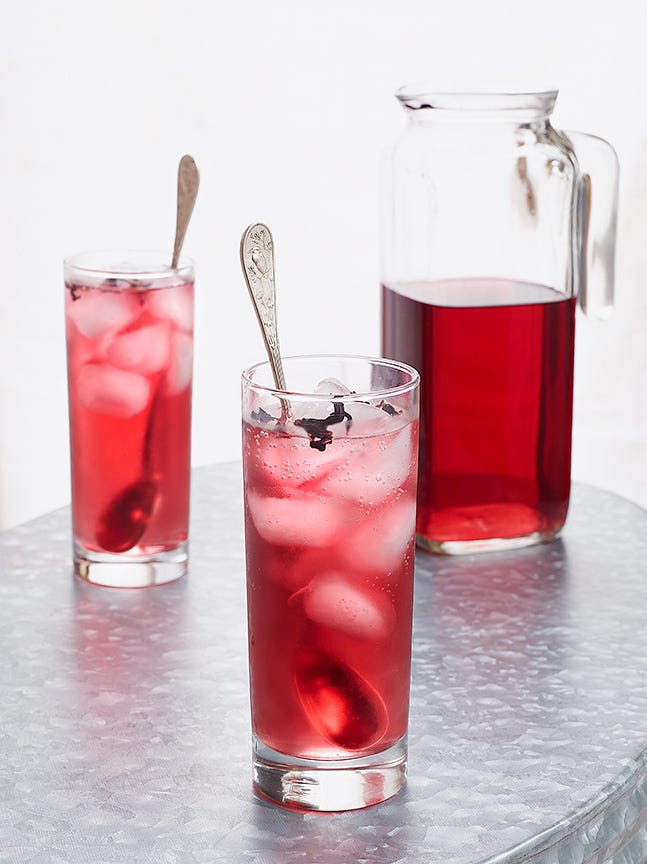
Hello, everyone. I’m writing from one of my favorite cafes, Healthy Being Café & Juicery in my hometown of Jackson, Wyoming. I popped in to sign a stack of my books, which were beautifully displayed in the center of the restaurant. It’s a busy time of year here, so I was excited to snag the table where I like to write—tucked away in a corner overlooking the lawn—while enjoying a plate of caprese toast (made with cashew cream, roasted tomatoes, and basil oil). I am grateful for places like Healthy Being that offer a full menu of really good brain-healthy dishes that feel like a treat.

Today, I am sharing one of my favorite recipes to help you stay hydrated this summer: the Hot Hibiscus Iced Tea from the Brain Health Kitchen book. Plus, I have a new seasonal brain-healthy menu from the book that makes good use of summer cucumbers, zucchini, tomatoes, and berries. But first, let’s take a look beyond the headlines from the Alzheimer’s Association International Conference (AAIC) held in Amsterdam last week.
Today’s newsletter, the first of the month, goes out to all subscribers (both free and paying) so feel free to share.
Brain Health News from AAIC 2023
I couldn’t get to Amsterdam this summer to attend AAIC in person, but I was able to join much of the conference virtually. The most exciting paper presented was the follow-up to the MIND diet study—the MIND Diet Trial—that I detailed in the last post. Other research presented delved into the latest in drug therapy and early diagnosis of Alzheimer’s. For example, will it soon be possible to diagnose Alzheimer’s with just a drop of blood? Read on for more studies with real-life applications.
Hearing Aids Slow Cognitive Decline in Older Adults with Hearing Loss
The Aging and Cognitive Health Evaluation in Elders (ACHIEVE) study is the largest study of hearing aids for reducing long-term cognitive decline in older adults. Hearing loss is emerging as a major risk factor for dementia, and was added to the list of modifiable risk factors by the Lancet Commission in 2020. But while it seems logical that correcting hearing loss would reduce dementia risk, this hypothesis hadn’t been thoroughly studied until now.
In this randomized, controlled clinical trial, the hearing intervention slowed cognitive decline in older adults at risk for dementia with mild to moderate hearing loss by 48%. The three-year intervention included use of hearing aids, a hearing “toolkit,” and ongoing instruction and counseling with an audiologist.
The Take-Away: Be proactive about your hearing. Get a hearing test every 3 years after age 50 or more frequently if you detect changes. Most importantly, seek treatment for hearing loss before it has a chance to erode your cognitive health.
Volunteers Have Better Brain Health
Adults over 65 who volunteer have better executive function and episodic memory according to a study of a racially diverse population in the Kaiser Healthy Aging and Diverse Life Experiences Study (KHANDLE). Additionally, those who volunteered several times per week had the highest levels of executive function.
Researchers postulate that volunteering may be important for better cognition in late life and could serve as a simple intervention in all older adults to protect against risk for Alzheimer’s disease and associated dementias. In a paper published earlier this year, data from KHANDLE showed that occupational complexity is linked to better cognitive health with age, but that racial and ethnic minorities are disproportionately exposed to lower occupational complexity.
The Takeaway: If you retire, don’t retire your brain! Continue to build cognitive reserve by learning new skills and doing difficult thinking tasks. Perhaps volunteerism also helps maintain a sense of purpose in life, a common feature of healthy, dementia-free older adults.
The Latest on Brain-Protective Diets
In addition to the MIND Diet Trial, several presentations (most not yet published) bolstered what we already know about neuroprotective dietary patterns (like the Mediterranean diet) and specific nutrients for long-term brain health, including:
Mediterranean diet reducing inflammation related to Alzheimer’s disease when compared to Western diet
FINGER (Finnish geriatric study) trial showing that adherence to recommendations on vegetables, fruit, berries, fish, fiber, while reducing saturated fat is linked to better cognitive performance over 2 years
Mediterranean diet as a key dietary approach to prevent dementia, regardless of genetic predisposition
Polyphenols (potent plant-based nutrients) are significantly associated with lower inflammation and better logical problem-solving
Vitamin B12 is important for people over 60, where deficiencies show lower cognitive performance
Another large study (378,000 participants in the UK) showed that tea consumption was significantly associated with reduced risk of dementia.
The Takeaway: While finding a cure for Alzheimer’s is paramount, the real gains are being made in the realm of prevention. The studies continue to show that certain foods and dietary patterns are our first defense in protecting the brain from Alzheimer’s.
Treating Early Alzheimer’s With Donanemab
Very positive data was presented about the donanemab, a drug that removes amyloid plaque from the brain. You may recall that another anti-amyloid drug, lecenomab, also showed benefit in Alzheimer’s patients last year.
In the TRAILBLAZER-ALZ 2 clinical trial, announced last week, results showed donanemab significantly slowed cognitive and functional decline in people with early symptomatic Alzheimer’s disease (either mild cognitive impairment or mild dementia). The beneficial treatment effect continued to increase relative to placebo over the course of the trial, with the largest differences versus placebo seen at 18 months. Study participants at the earliest stage of disease had greater benefit, with 60% slowing of decline compared to placebo. Significant benefits were also seen in more advanced patients.
As with other anti-amyloid treatments, this treatment may have serious side effects, like brain swelling and bleeding. And, people living with Alzheimer’s seem to benefit most if the drug is given early in the course of the disease. This and other studies highlight the importance of early diagnosis to slow disease progression. Eli Lilly awaits approval from the U.S. Food and Drug Administration (FDA), with action expected later this year.
The Takeaway: Anti-amyloid drugs like donanemab and lecanemab remove amyloid plaques from the brains of people living with Alzheimer’s. This is a huge breakthrough in drug therapy! While many experts are cautiously optimistic about using these drugs, this is still not a cure. Amyloid is only one aspect of this complex disease. These anti-amyloid drugs will become an important part of treating early stage disease.
A Blood Test For Alzheimer’s
The problem: Tests used to diagnose Alzheimer’s are either expensive, invasive, or both.
The solution: Developing a reliable blood test from a simple finger prick drop of blood.
While this may seem futuristic, researchers are getting closer to finding such a test, according to data presented at AAIC. A pilot study (not yet published) from the University of Gothenburg and Lund University in Sweden looked at detecting substances called neurofilament light (NfL), glial fibrillary acidic protein (GFAP), and tau (p-tau181 and 217) circulating in the blood as disease and prevention markers. They presented data to show that their blood test is accurate in diagnosing Alzheimer’s 85% of the time (compared to 55% with a standard doctor’s diagnosis). And, it was reliably collected at home by caregivers, eliminating a barrier to screening for dementia—having to go to a doctor’s office.
The Takeaway: An accurate finger stick blood test could help determine if someone with mild dementia symptoms has Alzheimer’s and could be a candidate for one of the anti-amyloid drugs (which work better the earlier they are started). And, for those who don’t show any symptoms, a blood test can serve as an early warning for risk of dementia, motivating people to change their lifestyle, diets, and behavior to change course to delay or even completely avoid disease. Someday soon, checking an Alzheimer’s blood test will be just as common as checking your cholesterol. This is good news, indeed!
Community is a key ingredient for healthy brain aging. Upgrade your subscription as a paying or founding member for full access to this community: brain health deep dives, downloadable shopping guides, new brain-healthy recipes, and more. You’ll also be able to join our conversations and ask me your questions here.
Plus, founding members get 4 live kitchen chat/cooking classes per year!
August BHK Cookbook Club
AUGUST 2023
Smashed Cucumber, Tomato, and Olive Salad
Mushroom Bolognese on Zucchini Nests
Whole Grain Blackberry and Blueberry Cornbread

This month, I have lots of ideas for cooking with peak season farmers market produce. The Smashed Cucumber, Tomato, and Olive Salad (page 324) employs a few easy cooking techniques that may be new to you. For example, have you ever smashed cucumbers instead of slicing them? This creates naturally jagged edges to catch every drop of dressing. Tearing your olives instead of cutting them adds even more texture to the salad.

This mushroom bolognese (page 124) sauce becomes deeply flavored after a short simmer thanks to miso paste, tomato paste, lots of garlic, and two types of mushrooms. Serve it over raw or cooked zucchini noodles for a hearty vegetarian meal.

For dessert, gather your berries! This whole-grain quick bread (page 68) is all about the berries, both swirled into the batter and piled on top.
Read here about how the BHK Cookbook Club works.
You will need a copy of the book to access the recipes.
Find it at your favorite bookstore or online.
Hot Weather Calls For Cold Drinks
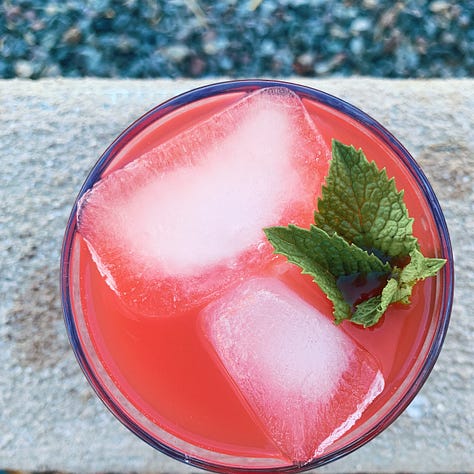
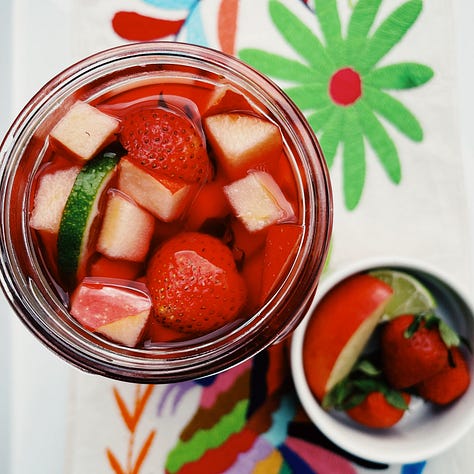
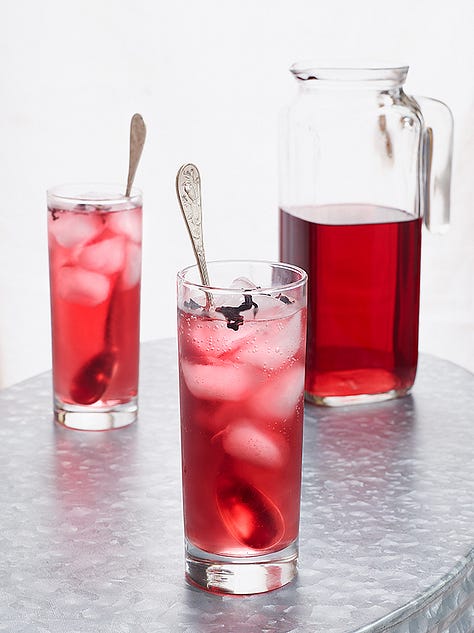
Here are the drinks I’ve been making on repeat this summer. All three of these pretty pink drinks provide brain health nutrients, are low in sugar, and double as festive mocktails.
Watermelon Juice with Honey and Salt: Adding a touch of sea salt makes this my favorite summertime sports recovery drink, but leave it out if you are on a low sodium diet.
Hibiscus Lime Sangria: Perfect for greeting friends with a hydrating, non alcoholic drink that’s as festive as it is healthful.
Hot Hibiscus Iced Tea: Here’s an iced tea recipe with a kick. A dash of cayenne makes this herbal infusion refreshingly spicy. Hibiscus tea has been found to lower blood pressure as much as antihypertensive medication, which contributes to better cardiovascular and brain health. It’s also caffeine-free, making it a vibrant and irresistible nonalcoholic beverage.
RECIPE: Hot Hibiscus Iced Tea
Serves 4
4 cups water
2 tablespoons dried hibiscus flowers or 6 hibiscus tea bags
1 2-inch piece fresh ginger, thinly sliced
¼ teaspoon cayenne
Ice
Sparkling water
Combine the water, hibiscus, ginger, and cayenne in a small pot and bring to a boil over high heat. Cover and steep away from the heat for about 10 minutes.
Place a small fine mesh strainer over a bowl. Strain the tea infusion into the bowl and discard the rest of the solids. Chill in the refrigerator until ready to use.
For each drink, fill a 10-ounce glass halfway with ice and add 1 cup cold tea. Top with sparkling water and gently stir.
Talking About Magnesium and More with Next Avenue
Before I go, I’ll share this interview with Next Avenue about the importance of brain health nutrients. The optimal dosage of magnesium for brain health has been in the news, thanks to a new study looking at this in women. I touched on many of these nutrients in the BHK Guide to Supplements in this post.
That’s all for today. If it’s summer where you are, I hope you are staying cool and will savor every moment of August. I can’t believe that in one month I’ll be in Italy to teach brain-healthy cooking at Monteverdi Tuscany and host the Sicily Brain Health Retreat. I am especially excited that I’ll be seeing some of you there.
Love,
Annie




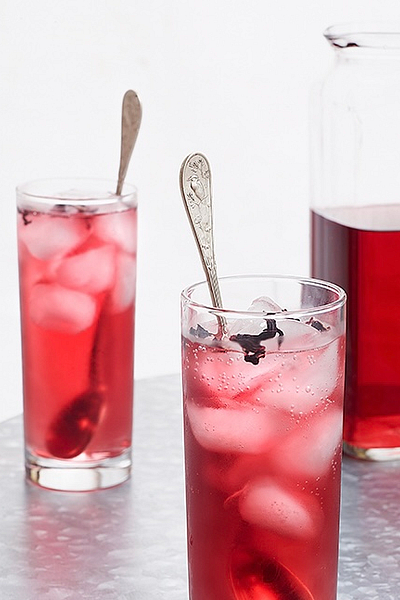
I discovered hibiscus tea when vacationing in Mexico. Love it! Now we make it a point to buy the large (pitcher sized) tea bags when shopping at Soriana at the beginning of our stay.
We discovered it works well as a “sun tea” also - leaving bags in a large glass jar/pitcher in the sun. But probably boiling it garners more beneficial elements than passive sun tea methods.